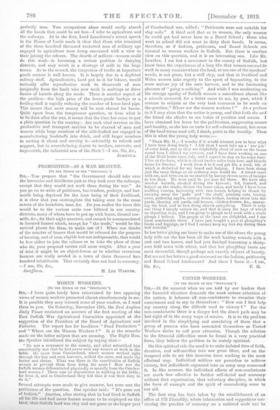WOMEN WORKERS: [TO TRH EDITOR OP FUR " SllICTATOR.1 SIR,—I
have quite lately been entertained by two opposing views of womenworkers presented almost simultaneously to me. It is possible they may interest some of your readers, so I send them to you. On Saturday, November 13th, the East Anglian Ijkilf nines contained an account of the first meeting of the East Suffolk War Agricultural Committee appointed at the suggestion of the President of the Board of Agriculture and Fieheries. The report has for headlines " Food Production " and " Where are the Women Workers 7" It is the remarks
made on the latter subject that are amusing. The Right Hon. the Speaker introduced the subject by saying that-
" He was a newcomer to the county, and what astonished him considerably was that he had never seen any women at work in the fields. Ho came from Cumberland, where women worked right through the hay and corn harvests, milked the cows, and made the butter and cheese. What was there in the constitution of Suffolk women to prevent them from doing the same ? How was the Suffolk woman differentiated physically or morally from the Cumber- land woman ? There was no degradation in working in the fields ; far from it, and in Cumberland they felt that it was their duty to
do it." • Several attempts were made to give answers, but none met the
pertinence of the question. One speaker said : " It's gone out of fashion." Another, after stating that he had lived in Suffolk all his life and had never known women to be employed on the land, that Suffolk land was clay and riot grass as the larger part of Cumberland was, added : " Petticoats were not suitable fiat clay soils." A third said that as to women, the only woman he could get had never been to a Board School ; those who went to school did not want to dirty their hands. It seems, therefore, as if fashion, petticoats, and Board Schools are inimical to women workers in Suffolk. But there is another view on this question, and it is an interesting one. Like Mr. Lowther, I am but a newcomer in the county of Suffolk, but know from the experiences of a long life that women can and do work in many counties where the land, to:use one of the speakers' words, is not grass, but a stiff clay, and that in Scotland and Wales women take eagerly to the sport of haymaking, to the more serious joy of the corn harvest, and to the fascinating pleasure of "going a-milking." And while I was meditating on the strange apathy of Suffolk women a coincidence alinost Like a miracle occurred, for a letter came to me, by post, which I venture to subjoin as the very best comment to be made on the question," Where are the women workers ? " As a preface to it I may state that the writer is young, and that both she and the friend she alludes to are ladies of position and means. - I have obtained her leave for the publication, suppressing names- and loCality, as she has no taste for self-advertisement, but some
of the local terms used will, I think, point to the 'oddity. Then. this is what the young lady wrote :--
" DEAR Ma. Ii, I wonder if it would interest you to hear what I have been doing lately ? I felt that I must take up a ' war job' of some kind, and as they are f rightfully short of men on the farms round here I offered my services, and I. have been working on one of the Wold farms since July, and I expect to stay on for some time. I live at the farm, which is ab out twelve miles from hero, and bicycle home for Sunday. I work from 6 to 6 and get 16s. a week, 10s. of which is deducted for my board and lodging. I have been doing just the same things as an ordinary man would do. A friend came with me, and between us wo started by hoeing eleven acres of turnips in ten' days. We were paid Bs. per acre for those. We have also weeded wurzels, stocked during the harvest ; led, teamed, and helped on the stacks, driven the horse rakes, and latelY I have been scuffling turnips, harrowing with two horses, helping to thrash by carrying away the ' pulls ' and ' tho chaff,' grinding oats, tenting cows, gathering apples, cutting down hedges, carting straw into the yards, cleaning out yards, calf-houses, chicken-houses, Ike., manur- ing the land, and in fact doing almost .eytrything. There is only one thing I simply cannot do, and that is carry the bags of wheat on threshing days, and I am going to plough next week with a single plough I believe. The people at the farm are delightful, and I am most comfortable there. I have just bought a pair of ploughboy's boots and leggings, as I find I cannot keep my feet dry during those wet months."
in her letter giving me leave to make use of the above the young lady tells me she has been all the week leading wurzels with a cart and two horses, and had just finished harrowing a thirty. acre field sown with wheat, and that her ploughboy boots are most successful, though perhaps not exactly objects of beauty. But are not her letters a good comment on the fashion, petticoattl and Board School hindrances ? And there I leave it.—I am,




















































 Previous page
Previous page